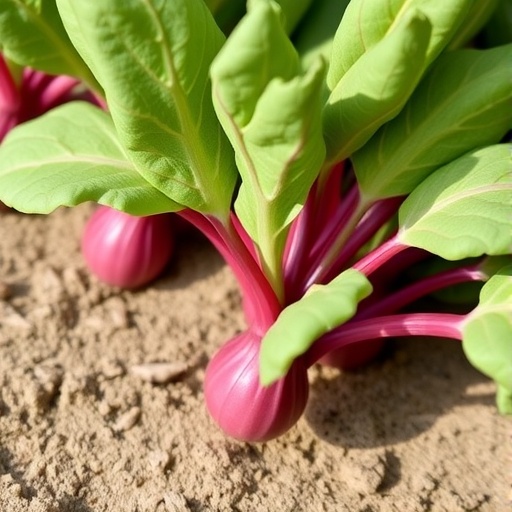Recent advancements in agricultural biotechnology have illuminated the intricate ways in which plants adapt to extreme environmental conditions. One such crop is sugar beet (Beta vulgaris L.), which is increasingly subjected to adverse climatic shifts, particularly drought. A groundbreaking study by O. Gaoua published in Discover Plants sheds light on the physiological, biochemical, and molecular mechanisms underlying drought tolerance in this vital crop, offering insights that could facilitate the development of more resilient varieties.
Drought stress is one of the most critical challenges in agriculture, directly impacting crop yield and quality. The study highlights that sugar beet, a significant source of sugar, has evolved a repertoire of adaptive responses to cope with water scarcity. These responses range from alterations in physiological processes to complex biochemical pathways that help in maintaining cellular integrity under stress. Understanding these mechanisms can potentially guide breeding programs aimed at enhancing drought resistance in sugar beet.
At the physiological level, the study illustrates how sugar beet can optimize its water usage through stomatal regulation. When faced with limited water availability, the plant reduces stomatal conductance, thereby conserving water. This adaptive feature allows it to maintain hydration while simultaneously minimizing the rates of photosynthesis. However, such a trade-off raises questions about the overall productivity of the plant under prolonged drought conditions, which necessitates a deeper exploration of its physiological responses.
Biochemically, Gaoua’s research delves into the role of osmoprotectants—small molecules that help stabilize cellular structures during osmotic stress. In sugar beet, this includes compounds such as proline and soluble sugars. The accumulation of these osmoprotectants has been identified as a critical factor for cellular adaptation, providing protection against dehydration and contributing to overall stress tolerance. The intricate signaling pathways that lead to osmoprotectant synthesis under drought conditions are crucial for understanding this balance between growth and survival.
On a molecular level, gene expression studies reveal that specific genes are upregulated in response to drought stress, further elaborating the plant’s adaptive capabilities. These genes encode proteins that are involved in critical functions such as stress signaling, antioxidant defense, and metabolic adjustments. Gaoua’s findings indicate that certain transcription factors play a pivotal role in modulating these stress-responsive genes, thus providing a molecular framework for developing drought-resistant sugar beet varieties.
Moreover, the research indicates that the integration of omics technologies—including genomics, proteomics, and metabolomics—offers a comprehensive approach to dissecting the complexities of drought tolerance. By leveraging high-throughput sequencing and advanced analytical techniques, the study uncovers novel biomarkers associated with drought resistance. These biomarkers could serve as significant indicators for breeders aiming to select and cultivate more resilient sugar beet cultivars.
The implications of Gaoua’s research extend beyond academic curiosity; they have practical applications in enhancing food security. As climate change continues to exacerbate water scarcity, understanding the mechanisms of drought tolerance becomes imperative for global agriculture. With sugar beet being a crucial crop for sugar production and biofuel, improving its drought resilience is a strategic focus that aligns with the wider goals of sustainable agriculture.
In light of these findings, the potential for genetic engineering and biotechnological applications in sugar beet breeding is profound. By integrating identified drought-tolerance traits into the breeding programs, researchers and agronomists can expedite the development of sugar beet varieties that not only thrive under drought conditions but also maintain high yields. This approach paves the way for more sustainable farming practices that can withstand the changing climate.
The path forward is not devoid of challenges. While the genetic basis for drought tolerance is being outlined, translating this knowledge into practical breeding strategies requires a multifaceted approach that includes understanding the interactions between genes and their environment. Additionally, public acceptance of genetically modified organisms (GMOs) remains a significant barrier that must be addressed in parallel with technological advancements.
Ultimately, the study by O. Gaoua serves as a catalyst for further research in plant stress biology, specifically in the context of climate resilience. By elucidating the integrated physiological, biochemical, and molecular mechanisms at play, it opens new avenues for scientific inquiry and agricultural innovation. As we face an uncertain future with an increasingly changing climate, the insights gleaned from this research provide a hopeful pathway toward enhancing crop stability and ensuring food security for generations to come. The intricate dance between genetics, environmental resilience, and agricultural practices underscores the importance of interdisciplinary approaches in tackling global challenges.
The fusion of technology with traditional breeding practices could very well define the future of agriculture. As scientists continue to unravel the complexities of plant responses to environmental stress, the prospects of drought-tolerant sugar beet may soon transition from research laboratory to farmers’ fields. The work done by Gaoua may inspire a new wave of agricultural ingenuity, one that not only helps farmers adapt to the whims of nature but equips them with the tools to influence it positively.
In summary, the relationship between drought tolerance mechanisms in sugar beet and the implications for modern agriculture emphasizes the need for a deep understanding of plant biology in the face of climate change. As the world looks to science and innovation for solutions, studies like Gaoua’s will play a pivotal role in shaping sustainable agricultural practices that can meet both current and future demands.
Subject of Research: Mechanisms of drought tolerance in sugar beet (Beta vulgaris L.)
Article Title: Integrating physiological, biochemical, and molecular mechanisms reveals insights into drought tolerance in sugar beet (Beta vulgaris L.)
Article References:
Gaoua, O. Integrating physiological, biochemical, and molecular mechanisms reveals insights into drought tolerance in sugar beet (Beta vulgaris L.).
Discov. Plants 2, 325 (2025). https://doi.org/10.1007/s44372-025-00416-9
Image Credits: AI Generated
DOI: https://doi.org/10.1007/s44372-025-00416-9
Keywords: Drought tolerance, sugar beet, physiological mechanisms, biochemical pathways, molecular biology, climate resilience, genetic engineering.
Tags: adaptive responses of sugar beetagricultural biotechnology advancementsbiochemical pathways in drought resistancebreeding programs for resilient cropsclimate change impact on cropscrop yield and quality under droughtinsights from Discover Plants studymolecular mechanisms in sugar beetphysiological mechanisms in plantsstomatal regulation in sugar beetsugar beet drought tolerancewater conservation strategies in plants





